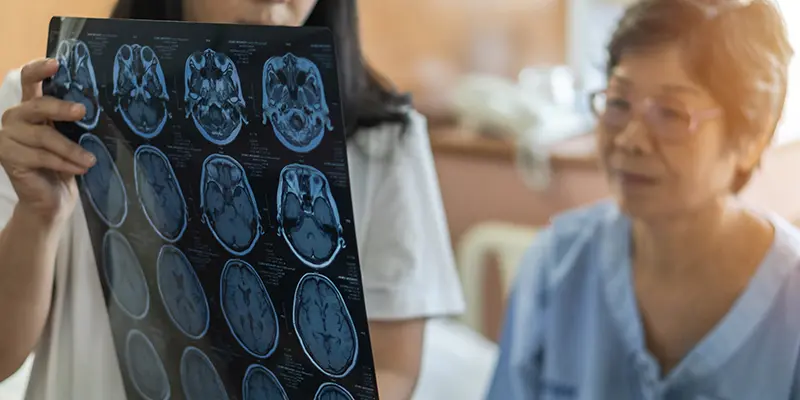
Armored vehicles, stun guns, tear gas—these are some of the tools law enforcement personnel use in the field. But the National Police Association is realizing that there is one weapon in police officers’ arsenal that is more powerful than any other—the brain.
The National Police Association is realizing that there is one weapon in police officers’ arsenal that is more powerful than any other—the brain. Click To Tweet
The National Police Association has begun encouraging all of its officers to support their brain health by following the research, advice, and books of 12-time New York Times bestselling author, psychiatrist, and founder of Amen Clinics, Daniel G. Amen, MD. A brain health expert, Dr. Amen has scanned the brains of many police officers as part of a full evaluation at Amen Clinics and has worked closely with some police departments to implement a program that promotes better brain health.
IMPACTS OF A CAREER IN LAW ENFORCEMENT ON BRAIN HEALTH
A wealth of research shows that a career in law enforcement exposes officers to a variety of stressors that can have a negative impact on brain health. Here’s what the National Police Association is recommending to its officers and what you can learn from Dr. Amen’s strategies to optimize the brain.
Head Injuries
There’s a concussion crisis in law enforcement. There’s a shortage of statistics on the number of traumatic brain injuries (TBIs) suffered by law enforcement personnel, however, police officers are 3 times more likely to experience a nonfatal injury than all other U.S. workers, according to a 2018 study in the American Journal of Preventive Medicine. According to Dr. Amen, mild TBIs are a major cause of mental illness but few people know it because traditional psychiatrists never look at the brain.
Optimizing brain health: The National Police Association now recommends that officers wear protective headgear more frequently in an effort to avoid head trauma. Dr. Amen also suggests avoiding playing contact sports, wearing a helmet when biking or skiing, and holding the railing when walking down stairs.
Emotional Trauma
Approximately 10% of first responders will develop post-traumatic stress disorder (PTSD), according to 2018 findings from SAMHSA (Substance Abuse and Mental Health Services Administration). PTSD is associated with an increased risk of anxiety, depression, anger, panic attacks, addictions, and other issues. The brain SPECT imaging work at Amen Clinics shows that PTSD is associated with too much activity in several areas of the brain, including the limbic system (the brain’s emotional center), basal ganglia (the brain’s anxiety center), and anterior cingulate gyrus (the brain’s gear shifter that helps you go from thought to thought or action to action). On SPECT scans, it typically resembles a diamond pattern. In a 2005 Amen Clinics evaluation of 6 police officers who had been involved in on-the-job shootings and who had developed PTSD, the “diamond pattern” was seen in all of their brain scans.
Optimizing brain health: The National Police Association recommends arming police officers with coping strategies for dealing with trauma and encourages seeing a mental health professional following traumatic events. One therapy Dr. Amen suggests for overcoming emotional trauma is EMDR (eye movement desensitization and reprocessing), a non-invasive treatment intended to remove the emotional charges attached to traumatic memories.
Mental Health Issues
Law enforcement personnel are at greater risk of mental health problems, with research showing that approximately 30% of first responders will develop some type of behavioral health condition compared to just 20% of the general population. Brain SPECT imaging shows that issues such as depression, anxiety, and PTSD (see above) are associated with abnormal brain activity.
Optimizing brain health: Loving and caring for the brain are foundational steps for police officers—and for everybody—to reduce symptoms associated with psychiatric disorders.
Substance Abuse
Studies have shown that police officers are at risk for drinking problems and substance abuse as a way to cope with the stresses of the job. Alcohol and drugs are toxic for the brain and impair brain function.
Optimizing brain health: The National Police Association says that introducing officers to effective stress-management techniques and addressing trauma-related issues can help them avoid turning to unhealthy coping mechanisms like alcohol and drugs. According to Dr. Amen, there is hope for recovery even if drugs or alcohol have negatively impacted brain function. Before-and-after SPECT scans of Amen Clinics patients with drug or alcohol addictions show some of the most dramatic improvements.
Sleep Issues
People in law enforcement often work rotating shifts, night shifts, and long hours that lead to fatigue or lack of quality sleep. Inadequate sleep is detrimental to brain health in many ways. During sleep, your brain cleans or washes by eliminating cellular debris and toxins that build up during the day (basically taking out the neural trash), consolidates learning and memory, and prepares for the following day. The brain processes that occur during sleep are also important for the health of your immune system, appetite control, and neurotransmitter production. Over time, sleep problems can lead to a higher risk of depression, ADD/ADHD, panic attacks, brain fog, memory problems, and dementia.
Optimizing brain health: The National Police Association is recommending that officers receive adequate time off to ensure they can get the sleep they need. According to Dr. Amen, everyone should aim for at least 7 hours of quality sleep each day. Creating a healthy sleep routine—shutting off electronics 2 hours before bedtime; making sure the bedroom isn’t too warm; and taking calming supplements like magnesium, melatonin, GABA, and 5-HTP—can be helpful.
PTSD, concussions, addictions, and other mental health and brain health issues can’t wait. During these uncertain times, your mental well-being is more important than ever and waiting until life gets back to “normal” is likely to make your symptoms worsen over time.
At Amen Clinics, we’re here for you. We offer in-clinic brain scanning and appointments, as well as mental telehealth, remote clinical evaluations, and video therapy for adults, children, and couples. Find out more by speaking to a specialist today at 888-288-9834 or visit our contact page here.





Love this so much an police are so afraid is losing thei ability to packs gun but also red rest and for us to look after them.
Comment by Chad Jolley — January 13, 2021 @ 5:28 AM
I was wondering what Dr. Amen things about “neuro optimizing” via computers ? Does it work? Not traditional Neurofeedback with a therapist monitoring but one where the patient hooks up to the machine and it’s done automatically via a Neuroptimal unit?
Comment by Steven Bulcroft — January 13, 2021 @ 6:06 AM
I just want to say that I am so glad to hear you address these issues regarding the health issues that officers may have. I hope as a group they are open to better health. This kind of change for all of us takes education and time. I’m so grateful for all of your work.
Comment by Charmaine — January 13, 2021 @ 8:35 AM
This is a program which would benefit all police officers. Please find a way to help them to be better prepared for this difficult and necessary position
Comment by Grace Del mastro — January 13, 2021 @ 8:37 AM
HELLO
It is so wonderful that you are doing something to help our POLICE ! We need them so much , i call on them to help me thro times as now ! They listening to my maby folish Problems , then say its o k we all need help some times. Never tell me i am wronge or foolish ! They should be paid at least double what they are getting ! They put thier life on line and some times loose it !
Comment by Era — January 13, 2021 @ 9:37 AM
I’m so glad that there is a police organization that’s looking at the idea of their officers having PTSD and the impact on their work.
Jean
Comment by Jean — January 13, 2021 @ 10:22 AM
If you haven’t tried yoga as an Rx then check out: Yogaforfirstresponders.org
Comment by Karl — January 13, 2021 @ 11:30 AM
What an encouraging article! I hope these resources are being offered to all first responders. I would also encourage focus on keeping blood sugar balanced and the brain well fed through eating high-protein, high nutrient density foods every 3 to 4 hours. This supports balanced mood, energy and behavior and allows for more effective involvement in therapeutic interventions such as EMDR.
Comment by Christina Veselak — January 14, 2021 @ 6:06 AM
As a retired policeman, I have concluded that most agencies do not pay enough to off-set the need for officers to engage in off duty work. Most work a normal shift of 8 hours plus, then go to an off duty paid security position for 6-8 hours. He/she then has 4-5 hours to rest before returning to his/her regular police work. Ones body/brain, is constantly on an alert status, thus resulting in anxiety, stress, with little reasoning response time to properly assess situations that possibly could have a much better result. The brain needs rest as well as the body. Lets appeal for higher pay.
Comment by Rome Hairston — January 16, 2021 @ 8:59 PM